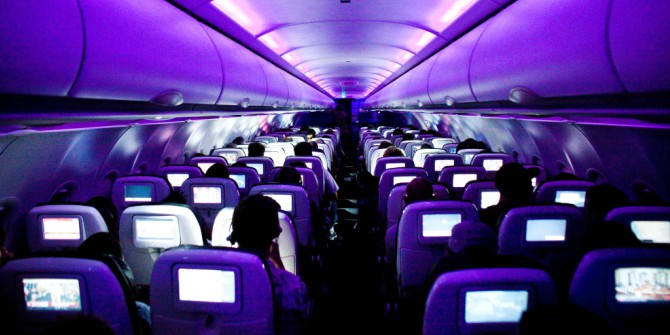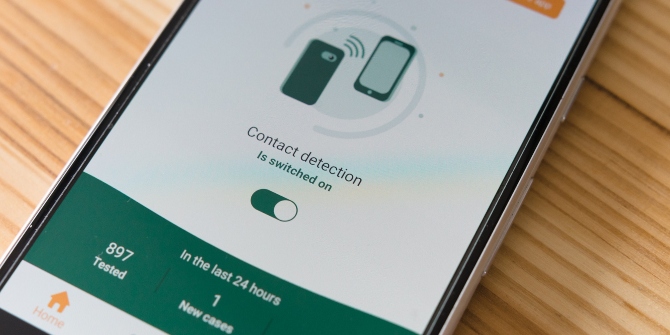 Girl waving, by Unsplash, under a CC0 licence
Girl waving, by Unsplash, under a CC0 licence
Ridesharing platforms such as Uber and Lyft have sparked a host of policy debates over the last half decade. Detractors argue that these firms put the public and consumers at significant risk. Advocates have argued that such services provide customers with a much needed service that circumnavigates the bureaucratic processes of licensed livery.
Yet, as this intense debate rages, pundits on both sides of the controversy have continuously made firm claims about the implications of the sharing economy, with little empirical evidence to back them up. In this research, we investigated one hotly discussed social benefit, the potential for reducing drunk driving. As the cost of operating under the influence are often born by taxpayers through the prosecution and incarceration of individuals convicted of DUI, the effective management of the number of and type of vehicle-for-hire services, as well as their social impact, is an important challenge with economic and social implications.
More specifically, we investigate the extent to which these services lead to a reduction in motor vehicle homicides. We contrast two services offered by the Uber platform in the State of California between 2009 and 2014. The first is Uber Black, a town car service that offers transportation with a significant markup over taxicabs (~20% – ~30%). The other, UberX, is a personalized driving service which offers significant discounts over taxis (~20% – ~30%).
Why might the introduction of Uber influence the rate of alcohol related motor vehicle homicides? Extant theory suggests many reasons why the introduction of electronic platforms may have an effect (Parker and Van Alstyne 2005). To the extent that it is often difficult to hire a cab based on the time, location, or even race of the patron (Meeks 2010), theory would suggest that the costs associated with finding transportation would decrease significantly when the app is used.
Insofar as the Uber app informs the driver of where the patron is, and the patron how long it will take the driver to arrive, the app mitigates what economists call information asymmetries, because both parties are no longer relying on random discovery of each other. Furthermore, research suggests that consumers may be willing to pay a significant price premium for such a service by trading off the costs of searching for a cab with the certainty of knowing when an Uber will arrive.
While the notion that drunken individuals make such rational calculations about willingness to pay during the decision to drive under the influence may seem counterintuitive, research from psychology and criminology suggests that this may be the case (Clarke and Cornish 1985, Cornish and Clarke 2014). This research, called Rational Choice Theory, argues that individuals commit crimes out of a set of rational trade-offs which benefit them, as opposed to psychoses or a natural predilection to commit crimes (Clarke and Cornish 1985, Cornish and Clarke 2014).
In the context of Uber, the implications of this research are particularly notable. While platform theory would suggest that drunk driving is the result of the individual being unable to find a cab, rational choice theory would suggest that individuals may be able to find drivers, but are electing to drive themselves based on the prices those taxis offer. More simply, because of the cost of hiring a taxi, and the perceived cost and probability of being apprehended by the police, individuals are making the rational trade-off to drive themselves while under the influence.
Interestingly, the decision to engage in drunk driving, even when controlling for self-control and other individual level factors, has strong support in extant research (Nagin and Paternoster 1993). This would suggest that services like Uber X, which offers a significant price reduction over taxi cabs, would have a far greater negative effect on the drunk driving rate because they both increase the accessibility of transportation and decrease the gap between the costs of being discovered driving under the influence, and the cost of hiring the driver.
Our results indicate that there is a significant effect of the entry of lower priced Uber options, that is, Uber X, indicating that price, coupled with service availability, is the main barrier to reducing the alcohol related motor vehicle fatality rate in many jurisdictions. Furthermore, results suggest a significantly stronger effect in larger cities. Finally, findings suggest that there is no effect when surge pricing is likely in effect (i.e. during weekends and drinking holidays), thereby underscoring the importance of cost considerations in affecting the number of deaths which occur in alcohol related crashes.
Economically, results indicate that the entrance of Uber X results in a 3.6% – 5.6% decrease in the rate of motor vehicle homicides per quarter in the state of California. With more than 13k deaths occurring nationally each year due to alcohol related car crashes, at a cost of 37 billion dollars, results suggest that a complete implementation of Uber X would create a public welfare net of over $1.3 billion to American taxpayers and save roughly 500 lives annually. Moreover, with costs to the individual (e.g. court costs, insurance rate increases, loss of income) usually totalling between US$ 5,000 and US$12,000 for the first DUI offence, significant benefits accrue to the patrons by leveraging these services.
These results also have many implications for the sharing economy. As vendors like AirBnB, Uber, and Lyft have been proposed as solutions to many market failures, our work provides cautionary evidence that consumers will continue to use established vendors when prices increase. Thus, while lower priced hotels and car services may be usurped by these emerging business models, minimal evidence exists to suggest that premium vendors will be displaced (as evidenced by the absence of a stable and consistent effect for the Uber Black Car service).
Furthermore, findings have important implications for the ongoing debate regarding the legality of services like Uber. Although the results of this investigation cannot speak to public welfare losses which may result from improper vehicle handling or safety on the part of consumers, they provide important insights into the potential benefits of the sharing economy. Considering that much of the debate surrounding Uber is speculative — with the absence of hard data and robust empirical investigations to quantify the losses or gains of such services — this work provides key insights into the benefits such services can provide to policy makers.
♣♣♣
Notes:
- This blog post is based on the authors’ paper Show Me the Way to Go Home: An Empirical Investigation of Ride-Sharing and Alcohol Related Motor Vehicle Fatalities, MIS Quarterly, 2016, Volume 41, Forthcoming.
- The post gives the views of its authors, not the position of LSE Business Review or the London School of Economics.
- Before commenting, please read our Comment Policy.
 Sunil Wattal is an Associate Professor of Management Information Systems at the Fox School of Business, Temple University. Dr. Wattal’s expertise focuses on economics of information systems, privacy and security, social media and crowd-funded marketplaces. His work has been published in top academic journals such as MIS Quarterly, Information Systems Research, Management Science, Journal of Management information Systems, and IEEE Transactions on Software Engineering. He currently serves as an AE at MIS Quarterly, and a special AE at ISR. His work has received several best paper awards and nominations, as well as been funded through grants from NSF and Kauffman Foundation. Dr. Wattal holds a Bachelor’s in Engineering from Birla Institute of Technology and Science Pilani (India), an MBA from Indian Institute of Management Calcutta (India), an MS (Industrial Administration) from Carnegie Mellon University, and a PhD from the Tepper School of Business, Carnegie Mellon University.
Sunil Wattal is an Associate Professor of Management Information Systems at the Fox School of Business, Temple University. Dr. Wattal’s expertise focuses on economics of information systems, privacy and security, social media and crowd-funded marketplaces. His work has been published in top academic journals such as MIS Quarterly, Information Systems Research, Management Science, Journal of Management information Systems, and IEEE Transactions on Software Engineering. He currently serves as an AE at MIS Quarterly, and a special AE at ISR. His work has received several best paper awards and nominations, as well as been funded through grants from NSF and Kauffman Foundation. Dr. Wattal holds a Bachelor’s in Engineering from Birla Institute of Technology and Science Pilani (India), an MBA from Indian Institute of Management Calcutta (India), an MS (Industrial Administration) from Carnegie Mellon University, and a PhD from the Tepper School of Business, Carnegie Mellon University.
 Brad N. Greenwood is an Assistant Professor of Management Information Systems and the Richard J Fox Faculty Fellow at the Fox School of Business, Temple University. He joined the faculty at Temple from the University of Maryland, College Park where he served as a visiting assistant professor. Dr. Greenwood’s research examines the intended and unintended consequence of innovation, and how access to the resulting information affects welfare at the interface between business, technology, and social issues; notably in the contexts of healthcare and entrepreneurship and has been published in leading academic journals. His corporate experience includes nearly eight years as a deputy program manager and analyst for CACI International, a mid-sized consulting firm in the greater Washington DC Metro Area. He received his Bachelor’s degree in Information Technology and Management Information Systems from Rensselaer Polytechnic Institute. Dr. Greenwood also received: a Master’s of Business Administration in IT Consulting from the University of Notre Dame; a Master’s of Informational Technology from Virginia Polytechnic Institute; and a PhD in Decision, Operations and Information Technology, with a minor in Strategic Management, from the University of Maryland, College Park.
Brad N. Greenwood is an Assistant Professor of Management Information Systems and the Richard J Fox Faculty Fellow at the Fox School of Business, Temple University. He joined the faculty at Temple from the University of Maryland, College Park where he served as a visiting assistant professor. Dr. Greenwood’s research examines the intended and unintended consequence of innovation, and how access to the resulting information affects welfare at the interface between business, technology, and social issues; notably in the contexts of healthcare and entrepreneurship and has been published in leading academic journals. His corporate experience includes nearly eight years as a deputy program manager and analyst for CACI International, a mid-sized consulting firm in the greater Washington DC Metro Area. He received his Bachelor’s degree in Information Technology and Management Information Systems from Rensselaer Polytechnic Institute. Dr. Greenwood also received: a Master’s of Business Administration in IT Consulting from the University of Notre Dame; a Master’s of Informational Technology from Virginia Polytechnic Institute; and a PhD in Decision, Operations and Information Technology, with a minor in Strategic Management, from the University of Maryland, College Park.





